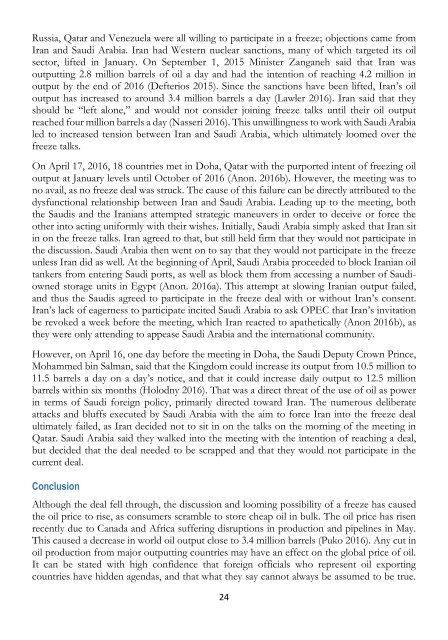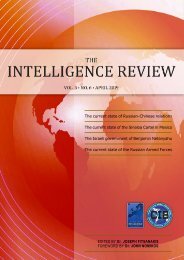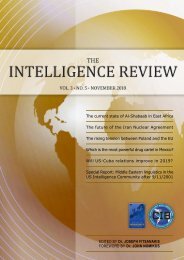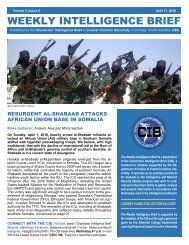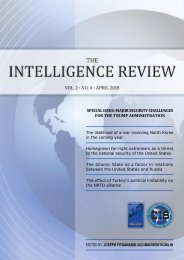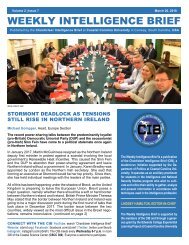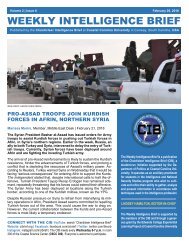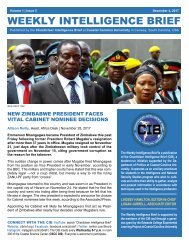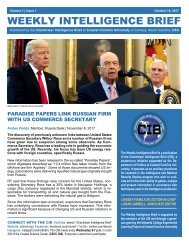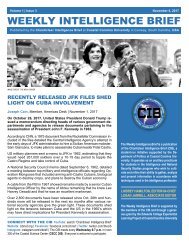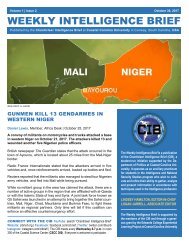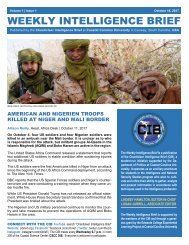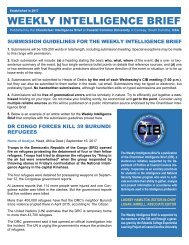The Intelligence Review | volume 1 | issue 1
This volume is the product of a collaboration between the European Intelligence Academy (EIA) and the Chanticleer Intelligence Brief (CIB), a student-run initiative supported by the Department of Politics at Coastal Carolina University in Conway, South Carolina, United States. Eleven CIB analysts tackle some of the most pressing and timely questions confronting intelligence observers today. Topics range from the price of oil to political stability in Venezuela, from the territorial cohesion of Iraq to the future of the Islamic State, and many other pressing subjects that feature daily in news headlines. CIB analysts propose carefully crafted and informed forecasts that outline future developments in some of the world's most unpredictable hot spots.
This volume is the product of a collaboration between the European Intelligence Academy (EIA) and the Chanticleer Intelligence Brief (CIB), a student-run initiative supported by the Department of Politics at Coastal Carolina University in Conway, South Carolina, United States. Eleven CIB analysts tackle some of the most pressing and timely questions confronting intelligence observers today. Topics range from the price of oil to political stability in Venezuela, from the territorial cohesion of Iraq to the future of the Islamic State, and many other pressing subjects that feature daily in news headlines. CIB analysts propose carefully crafted and informed forecasts that outline future developments in some of the world's most unpredictable hot spots.
You also want an ePaper? Increase the reach of your titles
YUMPU automatically turns print PDFs into web optimized ePapers that Google loves.
Russia, Qatar and Venezuela were all willing to participate in a freeze; objections came from<br />
Iran and Saudi Arabia. Iran had Western nuclear sanctions, many of which targeted its oil<br />
sector, lifted in January. On September 1, 2015 Minister Zanganeh said that Iran was<br />
outputting 2.8 million barrels of oil a day and had the intention of reaching 4.2 million in<br />
output by the end of 2016 (Defterios 2015). Since the sanctions have been lifted, Iran’s oil<br />
output has increased to around 3.4 million barrels a day (Lawler 2016). Iran said that they<br />
should be “left alone,” and would not consider joining freeze talks until their oil output<br />
reached four million barrels a day (Nasseri 2016). This unwillingness to work with Saudi Arabia<br />
led to increased tension between Iran and Saudi Arabia, which ultimately loomed over the<br />
freeze talks.<br />
On April 17, 2016, 18 countries met in Doha, Qatar with the purported intent of freezing oil<br />
output at January levels until October of 2016 (Anon. 2016b). However, the meeting was to<br />
no avail, as no freeze deal was struck. <strong>The</strong> cause of this failure can be directly attributed to the<br />
dysfunctional relationship between Iran and Saudi Arabia. Leading up to the meeting, both<br />
the Saudis and the Iranians attempted strategic maneuvers in order to deceive or force the<br />
other into acting uniformly with their wishes. Initially, Saudi Arabia simply asked that Iran sit<br />
in on the freeze talks. Iran agreed to that, but still held firm that they would not participate in<br />
the discussion. Saudi Arabia then went on to say that they would not participate in the freeze<br />
unless Iran did as well. At the beginning of April, Saudi Arabia proceeded to block Iranian oil<br />
tankers from entering Saudi ports, as well as block them from accessing a number of Saudiowned<br />
storage units in Egypt (Anon. 2016a). This attempt at slowing Iranian output failed,<br />
and thus the Saudis agreed to participate in the freeze deal with or without Iran’s consent.<br />
Iran’s lack of eagerness to participate incited Saudi Arabia to ask OPEC that Iran’s invitation<br />
be revoked a week before the meeting, which Iran reacted to apathetically (Anon 2016b), as<br />
they were only attending to appease Saudi Arabia and the international community.<br />
However, on April 16, one day before the meeting in Doha, the Saudi Deputy Crown Prince,<br />
Mohammed bin Salman, said that the Kingdom could increase its output from 10.5 million to<br />
11.5 barrels a day on a day’s notice, and that it could increase daily output to 12.5 million<br />
barrels within six months (Holodny 2016). That was a direct threat of the use of oil as power<br />
in terms of Saudi foreign policy, primarily directed toward Iran. <strong>The</strong> numerous deliberate<br />
attacks and bluffs executed by Saudi Arabia with the aim to force Iran into the freeze deal<br />
ultimately failed, as Iran decided not to sit in on the talks on the morning of the meeting in<br />
Qatar. Saudi Arabia said they walked into the meeting with the intention of reaching a deal,<br />
but decided that the deal needed to be scrapped and that they would not participate in the<br />
current deal.<br />
Conclusion<br />
Although the deal fell through, the discussion and looming possibility of a freeze has caused<br />
the oil price to rise, as consumers scramble to store cheap oil in bulk. <strong>The</strong> oil price has risen<br />
recently due to Canada and Africa suffering disruptions in production and pipelines in May.<br />
This caused a decrease in world oil output close to 3.4 million barrels (Puko 2016). Any cut in<br />
oil production from major outputting countries may have an effect on the global price of oil.<br />
It can be stated with high confidence that foreign officials who represent oil exporting<br />
countries have hidden agendas, and that what they say cannot always be assumed to be true.<br />
24


